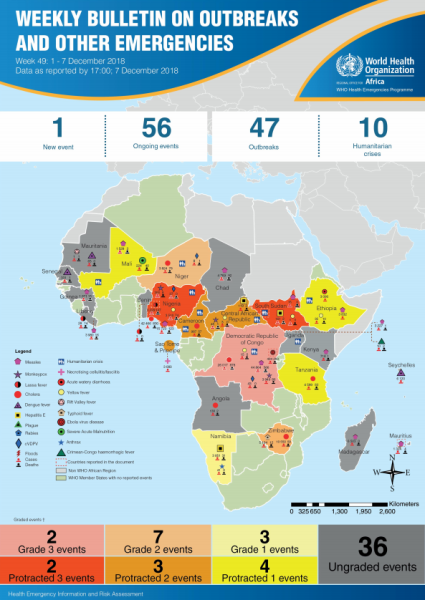
Week 49 edition on Outbreaks and Other Emergencies in the African Region
December 1, 2018
African Region
This Weekly Bulletin focuses on selected acute public health emergencies occurring in the WHO African Region. The WHO Health Emergencies Programme is currently monitoring 57 events in the region. This week’s edition covers key new and ongoing events, including:
- Ebola virus disease in the Democratic Republic of the Congo
- Lassa fever in Nigeria
- Measles in Mauritius
- Humanitarian crisis in South Sudan.
[[{"fid":"2445","view_mode":"default","fields":{"format":"default","alignment":"","field_file_image_alt_text[und][0][value]":false,"field_file_image_title_text[und][0][value]":"Week 49 on Outbreaks and Other Emergencies in the African Region.","external_url":""},"type":"media","field_deltas":{"1":{"format":"default","alignment":"","field_file_image_alt_text[und][0][value]":false,"field_file_image_title_text[und][0][value]":"Week 49 on Outbreaks and Other Emergencies in the African Region.","external_url":""}},"link_text":null,"attributes":{"title":"Week 49 on Outbreaks and Other Emergencies in the African Region.","class":"media-element file-default","data-delta":"1"}}]]
For each of these events, a brief description, followed by public health measures implemented and an interpretation of the situation is provided.
A table is provided at the end of the bulletin with information on all new and ongoing public health events currently being monitored in the region, as well as recent events that have largely been controlled thus closed.
Major issues and challenges include:
- The continuous propagation of the Ebola virus disease (EVD) in North Kivu and Ituri provinces, Democratic Republic of the Congo, as well as the underlying insecurity and pockets of community resistance are concerning. Efforts are ongoing to intensify conventional public health measures that are known to be effective (such as contact tracing and engaging communities) and the use of new tools at hand (namely immunization and therapeutics). It is anticipated that the current thrust in efforts will turn the tide in the evolution of the outbreak.
- Nigeria is seeing an increasing incidence of confirmed Lassa fever cases in the past few weeks. This trend is corresponding with the usual peak seasonal for Lassa fever in the country, starting from December to June. The recent increase should serve as an early warning and trigger for the authorities from relevant sectors at all levels to step up concrete preparedness and response measures, in order to prevent a repeat of the unprecedented outbreak that occurred at the beginning of the year.





More information click here